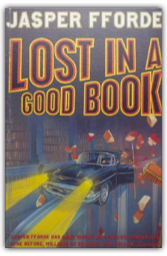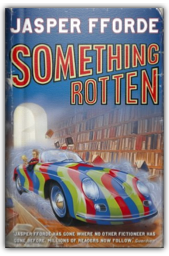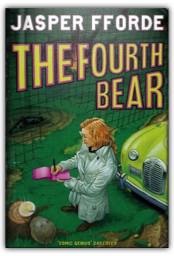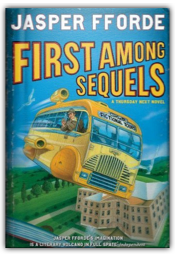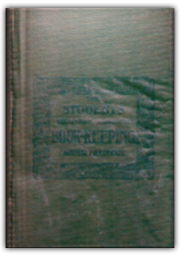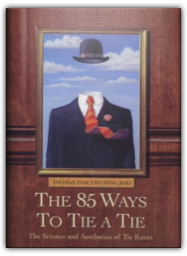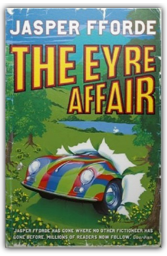 The Eyre Affair
Jasper Fforde
The Eyre Affair
Jasper Fforde
Pirouetting on the boundaries between sci-fi, the crime thriller and intertextual whimsy, Jasper Fforde's outrageous The Eyre Affairputs you on the wrong footing even on its dedication page, which proudly announces that the book conforms to Crimean War economy standard.
Fforde's heroine, Thursday Next, lives in a world where time and reality are endlessly mutable—someone has ensured that the Crimean War never ended for example—a world policed by men like her disgraced father, whose name has been edited out of existence. She herself polices text—against men like the Moriarty-like Acheron Styx, whose current scam is to hold the minor characters of Dickens' novels to ransom, entering the manuscript and abducting them for execution and extinction one by one. When that caper goes sour, Styx moves on to the nation's most beloved novel—an oddly truncated version of Jane Eyre—and kidnaps its heroine. The phlegmatic and resourceful Thursday pursues Acheron across the border into a Leninist Wales and further to Mr Rochester's Thornfield Hall, where both books find their climax on the roof amid flames.
Fforde is endlessly inventive: his heroine's utter unconcern about the strangeness of the world she inhabits keeps the reader perpetually double-taking as minor certainties of history, literature and cuisine go soggy in the corner of our eye. The audacity of the premise and its working out provides sudden leaps of understanding, many of them accompanied by wild fits of the giggles. This is a peculiarly promising first novel. —Roz Kaveney
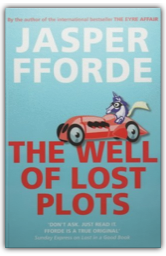 The Well of Lost Plots
Jasper Fforde
The Well of Lost Plots
Jasper Fforde
Word-of-mouth among readers often does more to make an author's name than any publicity campaign. That's certainly the case with Jasper Fforde, and The Well of Lost Plots will be eagerly devoured by his ever-growing coterie of admirers. Fforde writes playful and exhilarating books (which make delightful sport with the very art of fiction itself), and the experience his work offers the reader is quite unique. It's little wonder he has virtually created his own market. As in Lost in a Good Book and The Eyre Affair, this new novel is as much about itself and the whole world of books as it is about its putative plot. But a plot is needed so that Fforde can sustain his amazing inventiveness, and the narrative is kicked into action with the return of literary detective Thursday Next.
It's almost impossible to summarise the amazing adventures in which the beguiling (and confused) Ms Next becomes involved, but after she leaves Swindon (and her life inside an unpublished book called Caversham Heights), she becomes involved in the inauguration of a golden age of fictional narrative. But this turns out to be a very dangerous experience, and she finds herself having strange encounters with Dickens' Miss Havisham (even more eccentric than she was in Great Expectations) and enduring an unsettling journey into the world of Emily Bronte's Wuthering Heights. But who is the villain laying waste to her memories? And will she come to terms with the fact that her husband Landen exists only in her mind?
As this synopsis indicates, The Well of Lost Plots is a truly unique jeu d'esprit. It helps to be familiar with many of the books being riffed on here, but even if you're not, this will be one of the most idiosyncratic and often hilarious experiences you will find a within the pages of a book. Jasper Fforde enthusiasts know that already. —Barry Forshaw
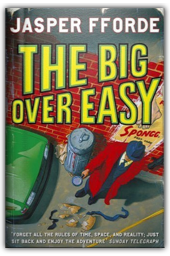 The Big Over Easy
Jasper Fforde
The Big Over Easy
Jasper Fforde
The word of mouth on Jasper Fforde has long been enthusiastic, among those in the know. But now that his readership has expanded immeasurably, the expectations for such books as The Big Over Easy are considerable. And whether or not those expectations will be met by this new book depends on the readiness of readers to strike out in new directions—just as the author has done. Fforde's speciality has long been the outrageous teasing of narrative forms, and there's a measure of that here, although more disciplined than in earlier books.
Rather in the fashion in which Stephen Sondheim exploded the world of fairytale in Into the Woods, Fforde here brings all the apparatus of the tough crime thriller to bear on the nursery rhyme. Minor baronet Humpty Stuyvesant Van Dumpty III has been found dead—and in pieces—beneath a wall in a less salubrious area of town. The perpetrator would appear to be his ex-wife, but she has shot herself. Detective Inspector Jack Spratt and his colleague Mary Mary are assigned to the case, and soon find themselves knee-deep in money-laundering, bullion smuggling and major problems with beanstalks.
This isn't quite the Fforde mixture as before, although he has previously favoured a crime motor for his plots. The skill in this outrageously entertaining (and rigorously plotted) concoction lies in a double conjuring trick: we are always amazed to find ourselves reading so assiduously about ludicrous figures (who become quite as interesting heroes as, say, Philip Marlowe) when common sense dictates only children should find such conceits entertaining. Not so! No child could appreciate the dazzling wordplay and witty imagination on offer here, and most readers will be more than happy to encounter detective Inspector Jack Spratt (and his contrary sidekick kick Mary Mary) again and again. —Barry Forshaw
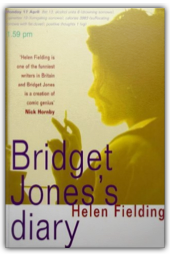 Bridget Jones's Diary
Helen Fielding
Bridget Jones's Diary
Helen Fielding
In the course of the year recorded in Bridget Jones's Diary, Bridget confides her hopes, her dreams, and her monstrously fluctuating poundage, not to mention her consumption of 5277 cigarettes and "Fat units 3457 (approx.) (hideous in every way)." In 365 days, she gains 74 pounds. On the other hand, she loses 72! There is also the unspoken New Year's resolution—the quest for the right man. Alas, here Bridget goes severely off course when she has an affair with her charming cad of a boss. But who would be without their e-mail flirtation focused on a short black skirt? The boss even contends that it is so short as to be nonexistent.
At the beginning of Helen Fielding's exceptionally funny second novel, the thirtyish publishing puffette is suffering from postholiday stress syndrome but determined to find Inner Peace and poise. Bridget will, for instance, "get up straight away when wake up in mornings." Now if only she can survive the party her mother has tricked her into—a suburban fest full of "Smug Marrieds" professing concern for her and her fellow "Singletons"—she—she'll have made a good start. As far as she's concerned, "We wouldn't rush up to them and roar, 'How's your marriage going? Still having sex?'"
This is only the first of many disgraces Bridget will suffer in her year of performance anxiety (at work and at play, though less often in bed) and living through other people's "emotional fuckwittage." Her twin-set-wearing suburban mother, for instance, suddenly becomes a chat-show hostess and unrepentant adulteress, while our heroine herself spends half the time overdosing on Chardonnay and feeling like "a tragic freak." Bridget Jones's Diary began as a column in the London Independent and struck a chord with readers of all sexes and sizes. In strokes simultaneously broad and subtle, Helen Fielding reveals the lighter side of despair, self-doubt, and obsession, and also satirizes everything from self-help books (they don't sound half as sensible to Bridget when she's sober) to feng shui, Cosmopolitan-style. She is the Nancy Mitford of the 1990s, and it's impossible not to root for her endearing heroine. On the other hand, one can only hope that Bridget will continue to screw up and tell us all about it for years and books to come. —Kerry Fried
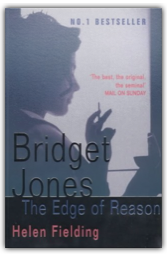 Bridget Jones: The Edge of Reason
Helen Fielding
Bridget Jones: The Edge of Reason
Helen Fielding
7:15 am Hurrah! The wilderness years are over. For four weeks and five days now have been in functional relationship with adult male thereby proving am not love pariah as previously feared. So begins The Edge of Reason, Bridget Jones' hilarious foray into the not-so-sexy realities of relationships, the laughable legions of self-help theories and a television career that would have her model "tiny shorts next to a blow-up of Fergie in gym wear". Picking up where Bridget Jones' Diary left off, everyone's favourite singleton has finally landed her love, Mark Darcy. However, she's finding—among other things—that her dreamboat is less than ideal. Aside from never doing the washing up or foraging through the isles at Tesco, Mark, it seems, has taken an interest in the viperous "jellyfish" Rebecca, who has "thighs like a baby giraffe" and a penchant for boyfriend snatching.
If that isn't enough, Richard "I'm thinking bunny girl! I'm thinking Gladiator! I'm thinking canvassing MP!" Finch, Bridget's smarmy, cocaine-encrusted boss and Executive Producer of Sit Up, wants her to be the show's clown, in effect making her the arse of television. What's more, a builder who has an obsession for large, slimy fish seems to have forgotten about the hole he knocked out in her flat, putting her entire life on display for the neighbours. Not to mention a mother who wants her to go to see Ms. Saigon with a Kikuya tribesman hijacked from Kenya.
Never fear, Bridge's singleton posse—Shazzer, Jude and Tom—are always a phone call away and armed with bottles of Chardonnay, packs of Silk Cut, pizza and a cornucopia of self-help literature. Whether they're decoding acronyms in singles ads (GSOH and WLTM? "Giant sore on head. Willy, limp, thin mollusc."), developing the ground-breaking "Pashima theory" or dolling out unsolicited advice, the FOBs (friends of Bridget) make up most of the comedy.
Although The Edge of Reason is filled with signature B.J. manoeuvres, such as drunken Christmas card writing and wearing an unruly rubber girdle, it's a departure from the original. Throughout most of its 422 pages the plot clips at a steady rate, then, much like Bridget's train of thought, the ending skitters, careens and breaks off into two incoherent tracks—one more absurd than the other. The outcome is a metamorphosed Bridget, one more reminiscent of a British Alley McBeal than the personification of England's everywoman. —Rebekah Warren
|
 The Eyre Affair
Jasper Fforde
The Eyre Affair
Jasper Fforde
 The Well of Lost Plots
Jasper Fforde
The Well of Lost Plots
Jasper Fforde
 The Big Over Easy
Jasper Fforde
The Big Over Easy
Jasper Fforde
 Bridget Jones's Diary
Helen Fielding
Bridget Jones's Diary
Helen Fielding
 Bridget Jones: The Edge of Reason
Helen Fielding
Bridget Jones: The Edge of Reason
Helen Fielding
 Made with Delicious Library
Made with Delicious Library



